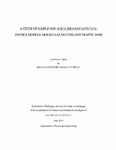| dc.rights.license | In Copyright | en_US |
| dc.creator | Gonzalez, Joshua Alejandro | |
| dc.date.accessioned | 2010-07-22T19:38:19Z | |
| dc.date.created | 2010 | |
| dc.identifier | WLURG38_Gonzalez_PHYS_2010 | |
| dc.identifier.uri | http://hdl.handle.net/11021/16293 | |
| dc.description | Thesis; [FULL-TEXT FREELY AVAILABLE ONLINE] | en_US |
| dc.description | Joshua Alejandro Gonzalez is a member of the Class of 2010 of Washington and Lee University. | en_US |
| dc.description.abstract | Traditionally, the objective of science has been to understand the fundamental simplicity and
elegance of the laws of nature. The advancement of the human race has for a long time been
predicated on the scientific discovery of the rules by which the underlying forces of nature and
society operate. Every facet of our modern day lifestyle, from our ability to drive cars, build
skyscrapers, create medicines for illness and connect with people from across the globe, relies on
our understanding of the basic principles of every field from physics and biology to economics
and political science. Never in the history of the world has the human race had such a wide-ranging
and deep understanding of society, nature, and the universe as a whole. However, as we
have pushed the boundaries of scientific discovery outward it has become readily apparent that
our bodies, society and nature all exhibit complex behaviors that cannot be explained without
considering the interactions of their constituent elements as part of a larger system. The study of
complex systems is an exciting and new interdisciplinary science which has lead to novel
insights into the beautiful and complex behavior of the natural world; it is the leading edge of
21st century scientific investigation.
The accumulation of scientific knowledge, as well as technological advancements, has finally
made the study of complex systems accessible. However, the field itself is as intricate and
diverse as the systems which it seeks to understand. While there are general concepts and goals
that form the theoretical underpinning of complex systems analysis, there also exists a great
amount of variation in the types of systems under investigation and in the methods available for
doing so. The study of complex systems requires a strong grounding in both mathematical and
analytic techniques as well as the design and engineering of experimental simulations, which
would be impossible without the aid of modem day computing systems. As more and more
investigators from every academic field begin to move into the realm of complex systems our
understanding of the world will be dramatically enriched and altered. New discoveries and
possibilities for the advancement of science, technology and society as a whole will emerge from
the efforts and achievements of those scientists who work collaboratively to uncover the
mysterious dynamics of complex systems. | en_US |
| dc.description.statementofresponsibility | Joshua Alejandro Gonzalez Siegal | |
| dc.format.extent | 149 pages | en_US |
| dc.language.iso | en_US | en_US |
| dc.rights | This material is made available for use in research, teaching, and private study, pursuant to U.S. Copyright law. The user assumes full responsibility for any use of the materials, including but not limited to, infringement of copyright and publication rights of reproduced materials. Any materials used should be fully credited with the source. | en_US |
| dc.rights.uri | http://rightsstatements.org/vocab/InC/1.0/ | en_US |
| dc.subject.other | Washington and Lee University -- Honors in Physics | en_US |
| dc.title | A Study of Simple Non-Equilibrium Statistical Physics Models: Molecular Motors and Traffic Jams (thesis) | en_US |
| dc.type | Text | en_US |
| dcterms.isPartOf | RG38 - Student Papers | |
| dc.rights.holder | Gonzalez, Joshua Alejandro | |
| dc.subject.fast | Biophysics -- Research | en_US |
| dc.subject.fast | Biological systems -- Computer simulation | en_US |
| dc.subject.fast | System theory | en_US |
| dc.subject.fast | Molecules -- Models | en_US |
| local.department | Physics | en_US |
| local.scholarshiptype | Honors Thesis | en_US |
